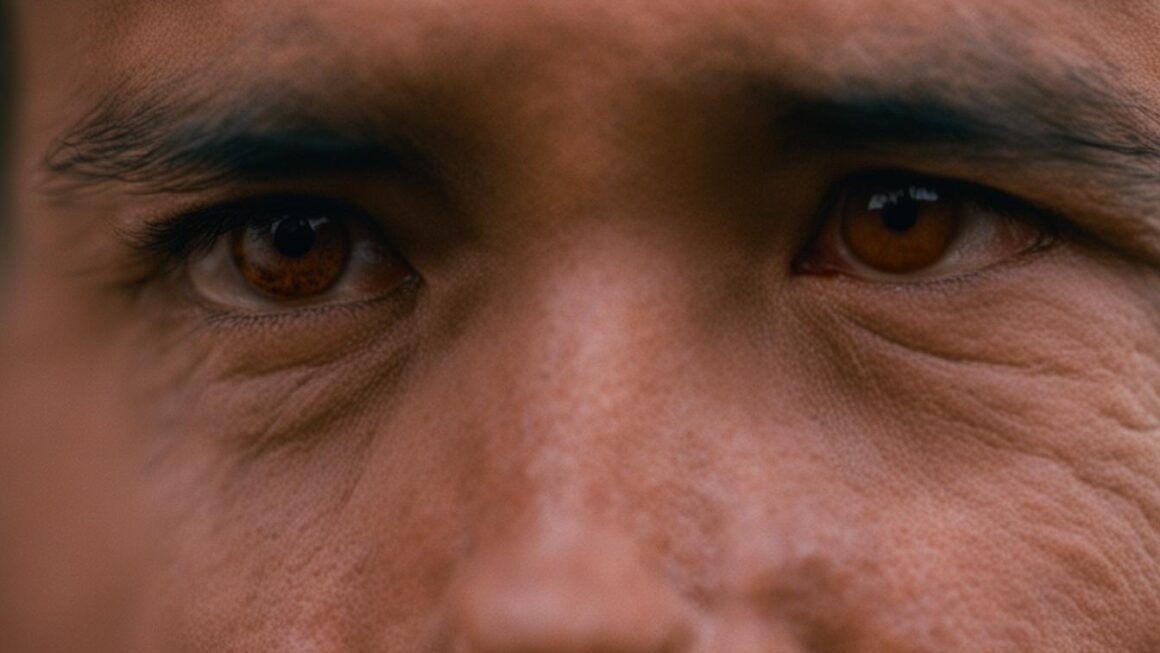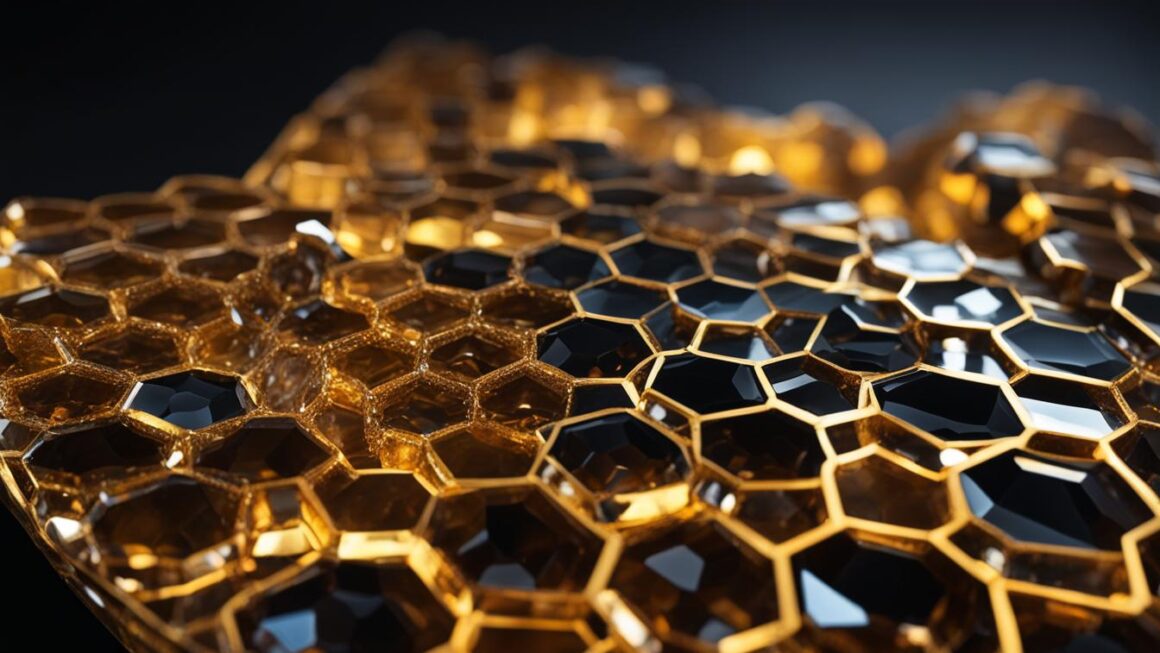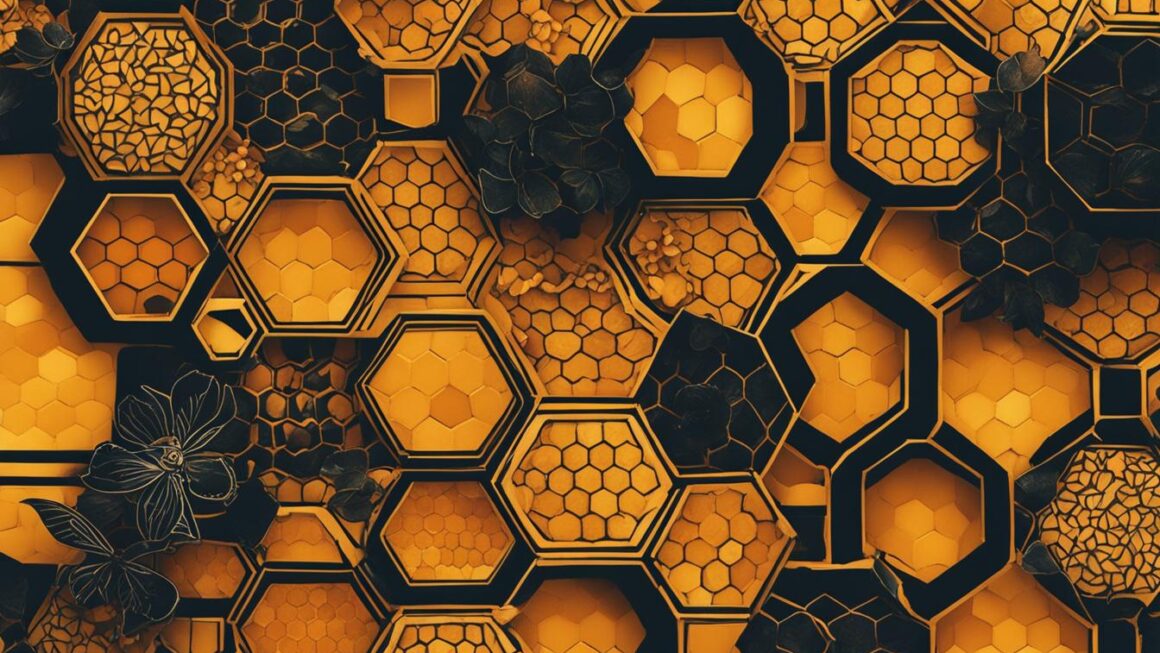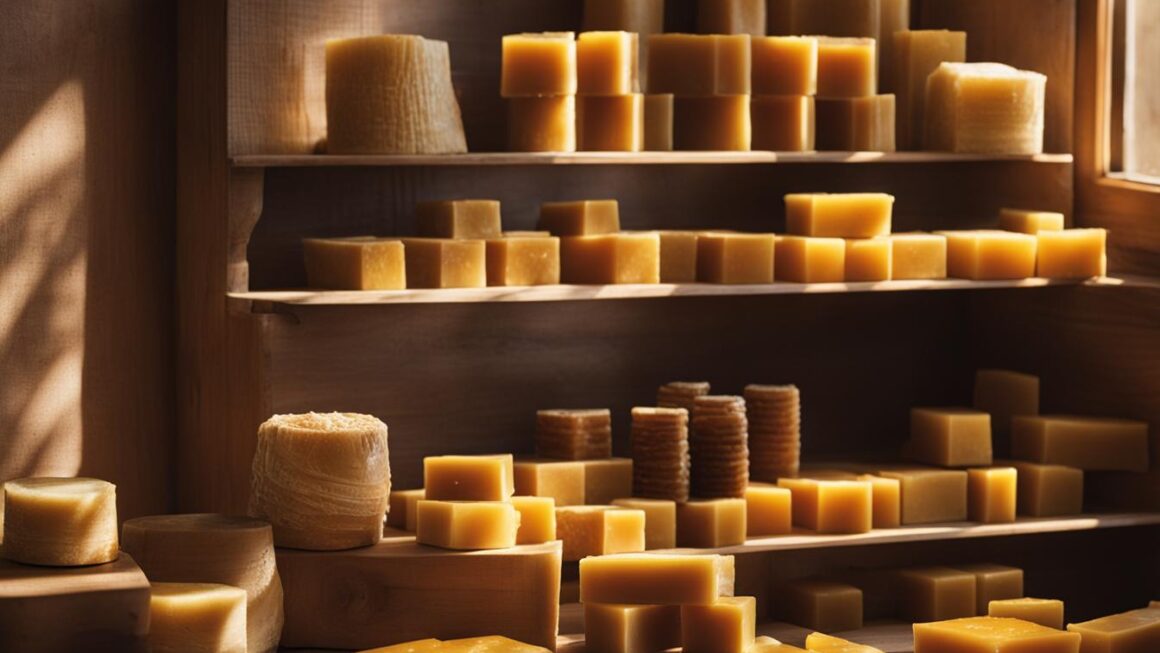Beeswax is a popular ingredient in skincare products, but many people wonder whether it can clog pores and cause skin issues. However, multiple sources confirm that beeswax does not clog pores and is not comedogenic. Instead, it acts as a protective barrier on the skin, locking in moisture while allowing it to breathe. Additionally, beeswax is rich in vitamin A and has various benefits for the skin, such as soothing and hydrating properties, acne prevention, and anti-inflammatory effects.
Key Takeaways:
- Beeswax does not clog pores and is not comedogenic.
- It acts as a protective barrier, locking in moisture while allowing the skin to breathe.
- Beeswax has soothing and hydrating properties for the skin.
- It helps prevent acne and has anti-inflammatory effects.
- Beeswax is rich in vitamin A, providing additional benefits for the skin.
What is Beeswax and How is It Produced?
Beeswax is a natural substance produced by honeybees through a fascinating process. It starts with the bees consuming honey, which then goes through their bodies and is excreted as tiny flakes of wax on their abdomens. The bees then collect these flakes and chew them up to create the wax that we know as beeswax. This production process is a testament to the remarkable abilities of bees and the intricate nature of their hives.
Beeswax is primarily produced in honeycombs, which are hexagonal structures made of beeswax. These honeycombs serve as storage units for honey, pollen, and brood. The bees build these intricate combs by secreting the beeswax from their bodies and shaping it into precise hexagonal cells. These cells provide the necessary structure and support for the hive and its inhabitants.
Once the honeycombs are filled, beekeepers can harvest the beeswax by removing the combs and extracting the wax. The wax is then subjected to a filtering process to remove impurities and debris, resulting in pure and clean beeswax. The quality of the filtering process plays a crucial role in determining the purity and effectiveness of the final beeswax product. It is essential to choose beeswax that has undergone thorough and reliable filtration to ensure its quality.
The Process of Beeswax Production:
- Bees consume honey
- Flakes of wax form on their abdomens
- Bees collect and chew the flakes to create beeswax
- Beeswax is produced in honeycombs
- Beekeepers harvest and filter the beeswax
The Benefits of Beeswax for Skin
Beeswax offers numerous benefits for the skin. Its moisturizing properties help to keep the skin hydrated and prevent dryness. The presence of vitamin A in beeswax contributes to its soothing and nourishing effects on the skin. Beeswax also acts as a protective barrier, shielding the skin from razor burn and irritation. Moreover, it has acne-preventing properties and can be used as a natural remedy for managing acne breakouts.
Moisturizing and Hydrating
Beeswax is an excellent moisturizer for the skin. It forms a protective layer on the skin’s surface, locking in moisture and preventing water loss. This helps to keep the skin hydrated and prevents dryness, making it an ideal ingredient for individuals with dry, flaky skin. Regular use of beeswax-based products can help restore the skin’s natural moisture balance and promote a healthier complexion.
Soothing and Nourishing
The vitamin A content in beeswax has soothing and nourishing effects on the skin. It helps to calm inflammation and irritation, making it beneficial for individuals with sensitive or reactive skin. Beeswax also provides essential nutrients to the skin, promoting overall skin health and radiance. Its natural emollient properties help to soften and smoothen the skin, giving it a supple and youthful appearance.
Razor Burn Prevention and Acne Management
Beeswax acts as a protective barrier on the skin, shielding it from razor burn and irritation. It creates a smooth surface, allowing the razor to glide easily without causing nicks or cuts. This makes it an ideal ingredient for shaving products, providing a comfortable and irritation-free shaving experience. Additionally, beeswax has acne-preventing properties. It helps to regulate sebum production and unclog pores, reducing the risk of breakouts and blemishes. Regular use of beeswax-based skincare products can help manage and prevent acne, promoting clearer and healthier skin.
In conclusion, beeswax offers a range of benefits for the skin. Its moisturizing properties, vitamin A content, and protective barrier function make it an excellent ingredient for skincare products. From keeping the skin hydrated and nourished to preventing razor burn and managing acne, beeswax has proven itself to be a versatile and effective skincare ingredient. Incorporating beeswax into your skincare routine can help improve the overall health and appearance of your skin.
Beeswax Allergies and Sensitivities
While beeswax is generally well-tolerated by most people, it is important to be aware that some individuals may have allergies or sensitivities to this natural ingredient. Allergic reactions to beeswax are often caused by propolis, which is a substance that mixes with beeswax during the harvesting process. Propolis can trigger contact dermatitis in individuals who are sensitive to it, leading to skin reactions such as redness, itching, and swelling.
If you suspect that you may have an allergic reaction to beeswax, it is advisable to consult with a healthcare professional for proper diagnosis and guidance. They can help determine whether your symptoms are indeed caused by beeswax or if there might be other underlying factors involved. Proper evaluation is essential to ensure appropriate treatment and prevent further complications.
It is worth noting that allergic reactions to beeswax are relatively uncommon, and most people can safely use products containing this ingredient without any issues. However, if you have a known allergy to propolis or have experienced adverse skin reactions in the past when using beeswax products, it is best to avoid them and opt for alternative skincare options that are better suited to your specific needs.
When purchasing beeswax products, especially if you have a known sensitivity or allergy, it is crucial to carefully read the ingredient labels and choose reputable brands that prioritize quality control. This will help ensure that you are selecting products that are free from fillers and potential irritants, minimizing the risk of adverse reactions.
Beeswax for Natural and DIY Products
Beeswax is a versatile ingredient that can be used in a wide range of natural and DIY skincare products. Its unique properties and numerous benefits make it an excellent choice for those looking to create their own holistic alternatives to commercial products. By incorporating beeswax into your DIY projects, you can enjoy the advantages of using natural ingredients while avoiding the harmful chemicals often found in store-bought items.
One of the major benefits of using beeswax in DIY skincare is its moisturizing properties. Beeswax acts as a natural emollient, helping to lock in moisture and keep the skin hydrated. This makes it an ideal ingredient for creating homemade lip balms, lotions, and creams. Additionally, beeswax forms a protective barrier on the skin, sealing in moisture while allowing the skin to breathe.
Another advantage of using beeswax in your DIY endeavors is its ability to replace toxic chemicals commonly found in commercial products. Beeswax can be used as a natural alternative to synthetic waxes, petroleum-based ingredients, and other potentially harmful substances. By opting for beeswax, you can feel confident that you are using a safe and sustainable ingredient in your homemade skincare products.
Whether you’re making candles, chapsticks, makeup, or lotions, beeswax provides endless possibilities for creating natural and DIY products. By harnessing the power of beeswax, you can enjoy the benefits of wholesome ingredients while avoiding harmful substances. So why not give it a try and start incorporating beeswax into your DIY skincare routine?
Table: Comparison of Beeswax Alternatives
| Chemical Ingredients | Beeswax Replacement |
|---|---|
| Paraffin Wax | Beeswax |
| Petroleum Jelly | Beeswax |
| Synthetic Emollients | Beeswax |
| Artificial Fragrances | Beeswax with Essential Oils |
| Chemical Preservatives | Beeswax with Natural Preservatives |
“Using beeswax in DIY skincare is not only a natural and sustainable option, but it also provides a great opportunity to customize your products according to your preferences and needs.”
So if you’re looking to create your own natural skincare products and reduce your exposure to toxic chemicals, beeswax is a fantastic ingredient to include in your DIY projects. Its moisturizing properties, ability to replace harmful chemicals, and versatility make it a valuable addition to any homemade skincare routine.
Beeswax as an Acne Treatment
When it comes to treating acne, beeswax is a natural and effective solution. Thanks to its rich vitamin A content and anti-septic properties, beeswax can help combat acne breakouts and promote healthier skin. Unlike some oils and waxes that can clog pores, beeswax is breathable and allows the skin to maintain its natural balance.
One of the key benefits of using beeswax for acne is its vitamin A content. Vitamin A is known for its ability to promote healthy skin cell turnover and reduce inflammation. By incorporating beeswax into your skincare routine, you can help prevent and heal acne by reducing redness and swelling.
Furthermore, beeswax’s anti-septic properties make it an excellent ingredient for fighting acne-causing bacteria. It helps keep the skin clean and free from harmful microorganisms that can lead to breakouts. Plus, beeswax acts as a protective barrier, shielding the skin from environmental pollutants and irritants that can exacerbate acne.
Benefits of Beeswax for Acne Treatment:
- Rich in vitamin A, which promotes skin cell turnover and reduces inflammation
- Anti-septic properties help combat acne-causing bacteria
- Breathable and non-comedogenic, allowing the skin to maintain its natural balance
- Acts as a protective barrier, shielding the skin from environmental pollutants and irritants
When using beeswax for acne treatment, it is important to choose a high-quality, pure beeswax product to ensure optimal results. Look for organic options without filler ingredients that may irritate the skin. Incorporate beeswax into your skincare routine by using products such as beeswax-based creams, serums, or masks specifically formulated for acne-prone skin.
Overall, beeswax offers a natural and effective solution for treating acne. Its vitamin A content and anti-septic properties work together to promote clearer, healthier skin. Incorporate beeswax-based products into your skincare routine and enjoy the benefits of breathable skincare that helps fight acne-causing bacteria.
The Role of Beeswax in Natural Remedies
Beeswax, with its multifaceted properties, has been studied for its potential role in various natural remedies. Research suggests that beeswax may have beneficial effects on liver function and could even help manage symptoms of fatty liver. Studies have shown that beeswax may help normalize liver enzymes and reduce inflammation in individuals with fatty liver disease. This could be attributed to the anti-inflammatory properties of beeswax, which may help alleviate liver inflammation and promote overall liver health.
In addition to its potential benefits for liver function, beeswax has also been used in combination with honey as a treatment for candida. Candida is a type of yeast that can cause infections in the mouth, throat, and genital area. Research has shown that beeswax and honey have antifungal properties that may help inhibit the growth of candida and prevent infection. Although further studies are needed to fully understand the effectiveness of beeswax as a candida treatment, these initial findings are promising.
Furthermore, beeswax may play a role in naturally managing cholesterol levels. High cholesterol is a risk factor for heart disease, and natural remedies that can help lower cholesterol levels are of great interest. Some studies suggest that beeswax may have the ability to reduce cholesterol levels and improve lipid profile. This could be due to the presence of certain compounds in beeswax that have lipid-lowering effects. However, more research is needed to fully understand the mechanisms and potential benefits of beeswax in managing cholesterol levels.
Overall, beeswax shows promise in the field of natural remedies. Its potential role in promoting liver health, treating candida, and managing cholesterol levels makes it an intriguing ingredient for further exploration. As scientists continue to study and understand the full extent of beeswax’s benefits, it may become a valuable tool in natural healthcare.
Beeswax as an Anti-inflammatory Agent
Beeswax offers more than just moisturizing benefits for the skin. It also possesses powerful anti-inflammatory properties that can provide relief from joint pain and inflammation associated with conditions such as arthritis. Many individuals with arthritis turn to topical creams and ointments containing beeswax as a natural alternative to traditional pain relievers.
The anti-inflammatory effects of beeswax can be attributed to its ability to inhibit the production of inflammatory molecules in the body. This can help reduce swelling, redness, and pain in the affected joints. Additionally, beeswax creates a protective barrier on the skin, allowing the active ingredients in the topical creams to penetrate deep into the tissues and provide targeted relief.
Furthermore, beeswax’s anti-inflammatory properties make it an excellent choice for individuals with sensitive skin or those who prefer holistic skincare options. By incorporating beeswax into your skincare routine, you can harness its soothing effects and promote overall skin health.
Table: Comparison of Beeswax-based Topical Creams:
| Product | Ingredients | Anti-inflammatory Effectiveness | Skin-Friendly |
|---|---|---|---|
| Beeswax Cream A | Beeswax, Shea Butter, Essential Oils | High | Yes |
| Beeswax Cream B | Beeswax, Coconut Oil, Aloe Vera | Moderate | Yes |
| Beeswax Cream C | Beeswax, Olive Oil, Calendula Extract | Low | Yes |
| Synthetic Cream X | Artificial Chemicals, Petroleum Jelly | Variable | No |
When choosing a beeswax-based topical cream, it is important to consider the specific ingredients and their anti-inflammatory effectiveness. The table above provides a comparison of different beeswax creams, highlighting their ingredients, anti-inflammatory effectiveness, and skin-friendliness.
As shown in the table, Beeswax Cream A contains a combination of beeswax, shea butter, and essential oils, making it highly effective in reducing inflammation. Beeswax Cream B and C also offer anti-inflammatory benefits but to a lesser extent. On the other hand, synthetic Cream X, which contains artificial chemicals and petroleum jelly, may have variable anti-inflammatory effectiveness and is not as skin-friendly as the beeswax-based options.

Beeswax for Skincare Conditions
Beeswax has proven to be effective in managing various skin conditions, offering relief and improvement in symptoms. Whether it’s eczema, diaper rash, dermatitis, or psoriasis, beeswax provides valuable benefits for those struggling with these common skin issues. Its natural properties and nourishing qualities make it a go-to ingredient for holistic skincare routines.
Individuals with eczema can find relief with beeswax. Its moisturizing properties help soothe dry, itchy, and inflamed skin, reducing the discomfort and intensity of eczema flare-ups. Beeswax creates a protective barrier that locks in moisture, allowing the skin to heal and recover more effectively.
For diaper rash, beeswax acts as a protective shield for sensitive baby skin. It helps prevent further irritation by keeping moisture away from the skin, allowing it to heal naturally. Beeswax is a gentle and safe option for diaper rash treatment, ensuring that your little one stays comfortable.
Dermatitis and psoriasis can also benefit from the healing properties of beeswax. Its moisturizing and anti-inflammatory effects help soothe irritated and inflamed skin, reducing redness and discomfort. Beeswax acts as a natural moisturizer, restoring balance and promoting healthier skin.
Eczema Relief with Beeswax
Eczema, also known as atopic dermatitis, is a chronic condition characterized by dry, itchy, and inflamed skin. It affects millions of people worldwide, and finding effective relief can be challenging. Beeswax offers a natural solution for eczema management, providing moisture and protection to the skin.
When applied topically, beeswax creates a barrier that helps lock in moisture, preventing excessive dryness and reducing the intensity of eczema symptoms. It also acts as a shield against external irritants, such as harsh chemicals and environmental factors, that can worsen eczema flare-ups. By keeping the skin moisturized and protected, beeswax promotes the healing process and soothes the itching and inflammation associated with eczema.
In addition to its moisturizing effects, beeswax contains vitamin A, which helps promote skin health and regeneration. It aids in repairing the skin’s natural protective barrier, improving its overall condition and resilience. By incorporating beeswax into your skincare routine, you can experience relief from eczema symptoms and enjoy healthier, more comfortable skin.
Diaper Rash Treatment with Beeswax
Diaper rash is a common concern for parents with infants and young children. It occurs when the skin becomes irritated due to prolonged exposure to moisture, friction, and the acidity of urine and feces. Beeswax can be an effective natural remedy for diaper rash, providing a protective barrier and promoting healing.
When applied as a diaper rash ointment, beeswax creates a barrier that keeps moisture away from the skin, allowing it to heal and recover. It forms a protective layer that prevents further irritation from wet diapers and friction against clothing. Beeswax also has soothing properties that help reduce redness and inflammation, providing relief to the delicate baby skin.
Furthermore, beeswax is a safe and natural alternative to commercial diaper rash creams that may contain harsh chemicals or synthetic ingredients. By choosing beeswax-based products, parents can offer their little ones gentle and effective care for diaper rash, ensuring their comfort and well-being.
Managing Dermatitis and Psoriasis with Beeswax
Dermatitis and psoriasis are chronic skin conditions characterized by inflammation, redness, and itching. They can cause significant discomfort and affect daily life. Beeswax offers relief and management for these conditions, thanks to its moisturizing and anti-inflammatory properties.
Beeswax acts as a natural moisturizer, replenishing the skin’s moisture barrier and reducing dryness. By keeping the skin hydrated, it helps alleviate itching, redness, and flaking associated with dermatitis and psoriasis. The moisturizing effect of beeswax also promotes the healing process, allowing the skin to recover and maintain its natural balance.
Additionally, beeswax has anti-inflammatory properties that help reduce swelling and inflammation in dermatitis and psoriasis lesions. It soothes the skin and provides relief from discomfort, contributing to overall skin health. Incorporating beeswax into your skincare routine can aid in managing these conditions and improving the quality of your skin.
| Condition | Beeswax Benefits |
|---|---|
| Eczema | Moisturizes and soothes dry, itchy skin |
| Diaper Rash | Protects and heals irritated baby skin |
| Dermatitis | Reduces inflammation and promotes skin health |
| Psoriasis | Moisturizes and soothes inflamed skin |
“Beeswax offers a natural solution for managing skin conditions like eczema, diaper rash, dermatitis, and psoriasis. Its moisturizing, protective, and anti-inflammatory properties contribute to overall skin health and provide relief.” – Skincare Specialist
Choosing the Right Beeswax Product
When it comes to selecting a beeswax product, it’s important to prioritize quality and purity. To ensure you’re getting the best beeswax for your needs, look for options that are pure and organic. Pure organic beeswax is free from filler ingredients and is often considered the best choice for skincare and DIY projects. This type of beeswax is typically sourced from bees that have been raised in organic and pesticide-free environments, ensuring a high-quality product that is free from harmful chemicals.
Another consideration when choosing beeswax is whether to go for white or yellow beeswax. The main difference between the two lies in the filtration process. White beeswax undergoes a pressure-filtration process, resulting in a refined and lighter-colored product. On the other hand, yellow beeswax is less processed and retains a more natural state, often retaining the characteristic aroma of honey.
Deciding between white and yellow beeswax largely depends on your intended use. If you’re looking to make colored candles or prefer a more refined appearance in your skincare products, white beeswax may be the better choice. However, if you value a more natural and less processed option, yellow beeswax could be the ideal fit for your needs. Ultimately, it’s a matter of personal preference and the specific requirements of your projects.
By prioritizing pure organic beeswax and considering the difference between white and yellow varieties, you can ensure that you’re choosing the right beeswax for your skincare and DIY endeavors. Whether you’re making homemade candles, lip balms, or lotions, opting for high-quality beeswax will enhance the effectiveness and overall satisfaction of your creations.
The Health Benefits of Beeswax Candles
Beeswax candles offer numerous health benefits compared to traditional candles made from substances like paraffin. These candles are hypoallergenic and emit negative ions into the air, which can have various positive effects on well-being. Negative ions released by beeswax candles can improve air quality, promote stress relief, enhance mood, and benefit individuals with respiratory issues.
Unlike paraffin candles, which can release toxic chemicals and soot when burned, beeswax candles are a natural and safer alternative. They are known to produce minimal smoke and do not contain harmful additives or artificial fragrances. By choosing beeswax candles, you can create a healthier living environment and enjoy the relaxing ambiance they provide.
Beeswax candles are a natural and healthier option for improving indoor air quality. They release negative ions, which can help reduce airborne allergens, pollutants, and odors.”
Not only do beeswax candles have air-purifying properties, but they also burn cleaner and longer than other types of candles. Due to the high melting point of beeswax, these candles have a slower burn rate, meaning they last longer and provide more hours of enjoyment. Additionally, beeswax candles have a pleasant, natural scent that adds a touch of warmth and coziness to any space.
| Benefits of Beeswax Candles | Traditional Candles (Paraffin) |
|---|---|
| Release negative ions | May release harmful chemicals and soot |
| Improve air quality | Potentially contribute to indoor air pollution |
| Burn cleaner and longer | Shorter burn time and more soot |
| Natural and hypoallergenic | May contain synthetic fragrances and allergens |
| Pleasant natural scent | Artificial fragrances |
In summary, beeswax candles provide a healthier and more environmentally friendly option for illuminating your home. Their hypoallergenic nature, negative ion release, and air-purifying properties make them an excellent choice for individuals seeking a clean and natural candle option. So, why not incorporate the soothing glow and benefits of beeswax candles into your daily life?
Beeswax for Personal Care Products
Beeswax is a versatile and valuable ingredient in personal care products, offering a range of benefits for holistic skincare routines. Its natural properties make it an ideal choice for creating lip balms, lotions, soaps, and other skincare products. Incorporating beeswax into these products can provide nourishing and moisturizing effects while avoiding the use of harmful chemicals commonly found in commercial alternatives.
When used in lip balms, beeswax acts as a protective barrier, keeping the lips hydrated and preventing excessive dryness. It creates a soothing and moisturizing layer that helps to lock in moisture and maintain soft, supple lips. Additionally, the natural emollient properties of beeswax contribute to its ability to heal and repair chapped or cracked lips.
In lotions and creams, beeswax acts as a thickening agent, providing a rich and luxurious texture to the product. It helps to seal in moisture, making the skin feel smooth and hydrated. Beeswax also forms a protective barrier on the skin, preventing moisture loss and shielding it from external irritants.
| Personal Care Products | Benefits of Beeswax |
|---|---|
| Lip balms | Hydrates and protects lips, prevents dryness |
| Lotions and creams | Thickens and moisturizes skin, forms a protective barrier |
| Soaps | Provides a creamy texture, moisturizes and cleanses the skin |
In soaps, beeswax contributes to the creamy texture and smooth lather. It adds moisturizing properties to the soap, leaving the skin feeling nourished and refreshed. The presence of beeswax in soap formulations can be especially beneficial for individuals with dry or sensitive skin, as it helps to retain moisture and prevent further dryness.
By utilizing beeswax in personal care products, individuals can enjoy the holistic benefits of this natural ingredient. Its nourishing and moisturizing properties make it an excellent choice for maintaining healthy skin. Whether it’s in lip balms, lotions, soaps, or other personal care products, beeswax provides a safe and effective alternative to synthetic ingredients, offering a more sustainable and holistic approach to skincare.
The Importance of Choosing Quality Beeswax
When it comes to incorporating beeswax into your DIY projects or skincare routine, the quality of the beeswax you choose can make a significant difference. Opting for organic beeswax ensures that you are using a product that is free from harmful pesticides and chemicals. By selecting pure beeswax without filler ingredients, you can maximize the benefits and effectiveness of this natural ingredient.
Quality control is another crucial factor to consider when purchasing beeswax. Research the reputation of the brand or supplier to ensure that they follow strict quality control measures throughout the production process. This helps guarantee that you are getting a high-quality product that meets the necessary standards.
By investing in quality beeswax, you can have peace of mind knowing that you are using a safe and reliable product. Whether you are creating DIY skincare products or using beeswax for various purposes, such as candles or balms, choosing the right beeswax is essential for achieving the desired results.
| Benefits | Considerations | |
|---|---|---|
| Organic Beeswax | – Free from pesticides and chemicals – Ensures a pure and natural product |
– Higher cost compared to non-organic options |
| Pure Beeswax | – Maximizes the benefits and effectiveness – No filler ingredients |
– Can be more expensive than products with fillers |
| Quality Control | – Ensure a reliable and safe product – Meets necessary standards |
– Research the brand or supplier’s reputation |
Choosing quality beeswax is essential for experiencing all the benefits it has to offer. From skincare applications to DIY projects, investing in organic and pure beeswax ensures that you are using a safe and effective ingredient. Additionally, verifying the quality control measures of the brand or supplier gives you confidence in the product’s reliability and adherence to industry standards. By prioritizing quality when selecting beeswax, you can fully enjoy its natural properties and enhance your overall experience.
Conclusion
In conclusion, beeswax is a highly beneficial skincare ingredient with a multitude of advantages. It is a natural alternative to toxic chemicals found in many commercial products, making it a popular choice for those seeking natural alternatives. Beeswax does not clog pores and acts as a protective barrier, keeping the skin moisturized and nourished. Its soothing and hydrating properties, along with its rich vitamin A content, contribute to its effectiveness in managing various skincare conditions such as eczema, diaper rash, and psoriasis.
Moreover, beeswax’s anti-inflammatory properties make it valuable for individuals dealing with joint pain and inflammation caused by conditions like arthritis. Additionally, beeswax has been researched for its potential health benefits in treating liver function, candida, and cholesterol levels. It has a long history of use and has been found in historical artifacts, underscoring its significance.
By incorporating beeswax into your skincare routine and DIY projects, you can harness its natural goodness and enjoy its many benefits. Whether you use it in homemade candles, lip balms, lotions, or soaps, beeswax offers a holistic approach to personal care. Choose high-quality, organic beeswax to ensure you maximize its potential benefits and avoid filler ingredients. Embrace the power of beeswax as an effective skincare ingredient and natural alternative for a healthier and more nourished skin.
FAQ
Does beeswax clog pores?
No, beeswax does not clog pores. It acts as a protective barrier on the skin while allowing it to breathe.
What is beeswax and how is it produced?
Beeswax is a natural substance produced by honeybees. It is created when bees consume honey and filter out the wax from their bodies, forming a scale on their abdomen.
What are the benefits of beeswax for the skin?
Beeswax has moisturizing properties, soothing effects, and can prevent razor burn and acne. It is rich in vitamin A and has anti-inflammatory properties.
Can people have allergies or sensitivities to beeswax?
Some individuals may have allergies or sensitivities to beeswax, often caused by propolis, a substance that mixes with beeswax during the harvesting process.
Can beeswax be used for natural and DIY products?
Yes, beeswax is a versatile ingredient for creating natural and DIY skincare products such as candles, chapsticks, makeup, and lotions.
Is beeswax effective for acne treatment?
Yes, beeswax has acne-preventing properties and can be used as a natural remedy for managing acne breakouts.
Are there any health benefits of beeswax in natural remedies?
Beeswax has been studied for its potential to normalize liver function, treat candida, and aid in lowering cholesterol levels naturally.
Does beeswax have anti-inflammatory properties?
Yes, beeswax has anti-inflammatory properties and has been researched for its potential to ease inflammation and joint pain in conditions such as arthritis.
Can beeswax help with skincare conditions?
Beeswax has been used to alleviate symptoms of eczema, diaper rash, dermatitis, and psoriasis. It can also aid in healing stretch marks and scars.
How do I choose the right beeswax product?
It is essential to opt for a pure, organic option free from filler ingredients. Choose between white and yellow beeswax depending on the intended use.
What are the health benefits of beeswax candles?
Beeswax candles are hypoallergenic and emit negative ions into the air, which can improve air quality, promote stress relief, and benefit individuals with respiratory issues.
Can beeswax be incorporated into personal care products?
Yes, beeswax can be used in various personal care products such as lip balms, lotions, soaps, and candles, offering natural and holistic ingredients.
Why is choosing quality beeswax important?
It is crucial to choose pure organic beeswax free from filler ingredients. Research the reputation and quality control measures of the brand or supplier to ensure the best product.




